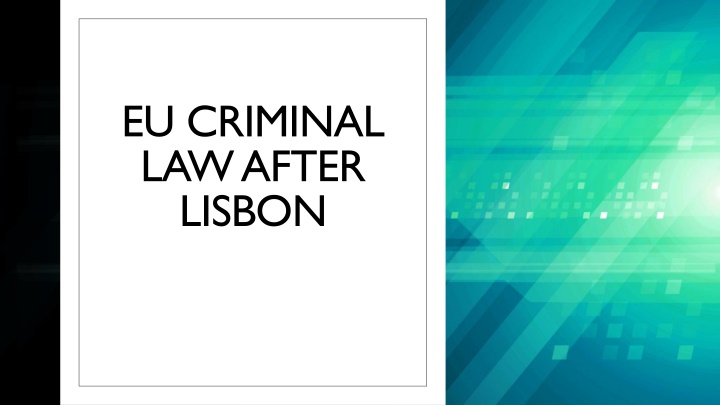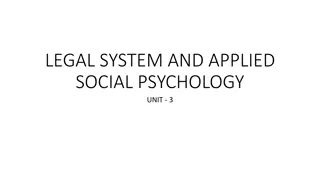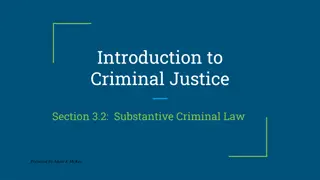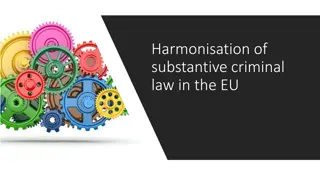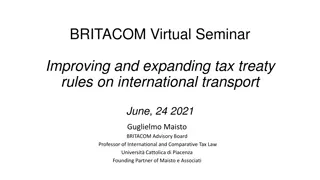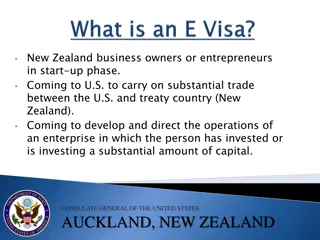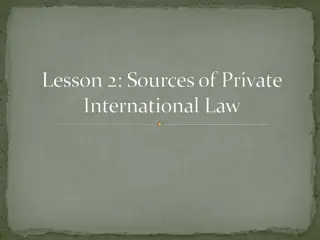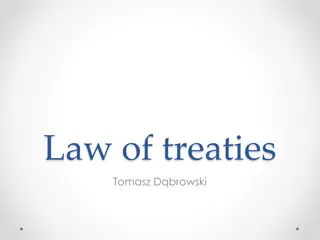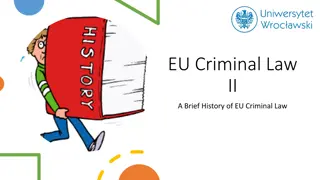Overview of EU Criminal Law Changes After Lisbon Treaty
The Lisbon Treaty signed in 2007 brought significant changes to EU criminal law, moving cooperation from the EU Treaty to the Treaty on the Functioning of the EU. It abolished the pillar structure, expanded the CJEU's competences in criminal law, and emphasized the area of freedom, security, and justice within the Union. Recent issues involve pushbacks at borders and the role of Frontex in addressing illegal migrant returns. The treaty emphasizes the principles of conferral, subsidiarity, and proportionality in governing EU competences.
Download Presentation

Please find below an Image/Link to download the presentation.
The content on the website is provided AS IS for your information and personal use only. It may not be sold, licensed, or shared on other websites without obtaining consent from the author.If you encounter any issues during the download, it is possible that the publisher has removed the file from their server.
You are allowed to download the files provided on this website for personal or commercial use, subject to the condition that they are used lawfully. All files are the property of their respective owners.
The content on the website is provided AS IS for your information and personal use only. It may not be sold, licensed, or shared on other websites without obtaining consent from the author.
E N D
Presentation Transcript
EU CRIMINAL LAW AFTER LISBON
Basic information about the LisbonTreaty Signed on 13 December 2007 Entered into force 1 December 2009 ECTreaty renamed Treaty on the Functioning of the EU Abolishment of pillar structure Cooperation in the field of criminal law moved from EU Treaty to Treaty on the Functioning of the EU Rules from the internal market became also the rules of the area of freedom, justice and security The CJEU full competences in the area of criminal law.
Area of freedom security and justice In the area of freedom security and justice, the external border conept translates into a guarantee that, within the Union, this area is ensured for its citizens. As a consequences, the TEU shuts the door on non-EU citizens claiming the benefits of the area of freedom, security and justice. It raises the question as the whether there is a difference in the teatment of EU citizens and non-EU nationals regarding the safeguards to which they are entitled. Generally speaking,however,criminal law does not make a distinction between perpetrator upon the basis of their nationality. A. Klip, European Criminal Law, Intersertia 2016, s. 23.
Current problem push-backs and the role of Frontex https://frontex.europa.eu/ Pushbacks, the forcible return of people across an international border without an assessment of their rights to apply for asylum or other protection, violate both international and EU law. OLAF investigators poured over information from open sources and media reports, sought documents from Frontex and the European Commission and interviewed 20 witnesses to investigate accusations of possible involvement or covering up of illegal pushbacks and accusations of misconduct or irregularities. https://www.euronews.com/my-europe/2022/10/14/eu-border-agency-frontex-covered-up-illegal-migrant- pushbacks-says-report
Article 3.2 The Union shall offer its citizens an area of freedom, security and internal frontiers, in which the free movement of persons is ensured in conjunction with appropriate measures with respect to external border controls, asylum, immigration and combating of crime. justice without the prevention and
The principle of conferral The competences of the EU are conferred on it by the Member States and order to attain the objectives that they share. Article 5TEU: 1. The limits of Union competences are governed by the principle of conferral. The use of Union competences is governed by the principles of subsidiarity and proportionality. 2. Under the principle of conferral, the Union shall act only within the limits of the competences conferred upon it by the Member States in the Treaties to attain the objectives set out therein. Competences not conferred upon the Union in theTreaties remain with the Member States. Article 2.2TFEU 2. When the Treaties confer on the Union a competence shared with the Member States in a specific area, the Union and the Member States may legislate and adopt legally binding acts in that area. The Member States shall exercise their competence to the extent that the Union has not exercised its competence. The Member States shall again exercise their competence to the extent that the Union has decided to cease exercising its competence.
The principle of subsidiarity Article 5.3.TEU Under the principle of subsidiarity, in areas which do not fall within its exclusive competence, the Union shall act only if and in so far as the objectives of the proposed action cannot be sufficiently achieved by the Member States,either at central level or at regional and local level, but can rather, by reason of the scale or effects of the proposed action, be better achieved at Union level Protocol no 2 on the application of the principles of subsidiarity and proportionality.
The principle of subsidiarity This prinicple distinguisges between areas in which the Union has exlusive competences (e.g. areas of common policy) and areas in which such exclusive competences does not exist. In such areas the EU may be competent, depending on the application of an effectivness criterion ( how action can be better achived ) The principle of subsidiarity may be used as a tool to proctec states sovereignty. Article 69 National Parliaments ensure that the proposals and legislative initiatives submitted under Chapters 4 and 5 comply with the principle of subsidiarity, in accordance with the arrangements laid down by the Protocol on the application of the principles of subsidiarity and proportionality.
Recital no. 57 directive 2013/48 Since the objectives of this Directive, namely setting common minimum rules for the right of access to a lawyer in criminal proceedings and in European arrest warrant proceedings and the right to have a third person informed of the deprivation of liberty and to communicate with third persons and with consular authorities while deprived of liberty, cannot be sufficiently achieved by the Member States, but can rather, by reason of the scale of the measure, be better achieved at Union level, the Union may adopt measures,in accordance with the principle of subsidiarity as set out in Article 5 TEU.In accordance with the principle of proportionality, as set out in that Article, this Directive does not go beyond what is necessary in order to achieve those objectives.
The principle of proportionality Article 5.4TEU 4. Under the principle of proportionality, the content and form of Union action shall not exceed what is necessary to achieve the objectives of theTreaties. EU cannot demand too much from EU Member States
Institutions 1. The European Parliament 2. The European Council 3. The Council 4. The Commision main task: to ensure that the Treaty is aplied and propeses legislation, which much then be adopted by the Council and the EP. 5. The Court of Justice 6. The European Central Bank 7. The Court od Auditors 8. European Public Prosecutor Office.
Agencies The European Ombudsman The Fundamental RightsAgency.
Quite important article 19 1. The Court of Justice of the European Union shall include the Court of Justice, the General Court and specialised courts. It shall ensure that in the interpretation and application of the Treaties the law is observed. Member States shall provide remedies sufficient to ensure effective legal protection in the fields covered by Union law. 2. The Court of Justice shall consist of one judge from each Member State. It shall be assisted by Advocates-General. The General Court shall include at least one judge per Member State. The Judges and the Advocates-General of the Court of Justice and the Judges of the General Court shall be chosen from persons whose independence is beyond doubt and who satisfy the conditions set out in Articles 253 and 254 of the Treaty on the Functioning of the European Union. They shall be appointed by common accord of the governments of the Member States for six years. Retiring Judges and Advocates-General may be reappointed. 3. The Court of Justice of the European Union shall, in accordance with the Treaties: (a) rule on actions brought by a Member State, an institution or a natural or legal person; (b) give preliminary rulings, at the request of courts or tribunals of the Member States, on the interpretation of Union law or the validity of acts adopted by the institutions; (c) rule in other cases provided for in the Treaties.
EU goals in the criminal law HARMONISATION of criminal law convergence of the leagal practise of the various legal systems based upon common standards. Harmonisation implies differences between EU Member States! But Sometimes the EU instituions unify some aspects (filds) of criminal law sensu largo. E.g. EU competition law. Common policies and co-ordination Common aproach to certain problems in the area od freedom,security and justice. E.g. roadmap for strengthening procedural rights of suspect and accused persons in criminal proceedings see next slides.
How to achive the EU goals? Legal tools:hard law and soft law. Hard law: the backbone of integration and harmonisation (regulation,directive) Soft law: instruments of control that are not leglislation, but which may be based upon legislation. E.g. some programess like the Stockholm promgramme or Hague programme the general guide form policy and initiatuves for comming years.
Harmonisation and approximation Postitive integration the UE harmonises the substantive law in a certain fild and, as a consequence of this, the discretion od the Member States for other measures becomes increasingly limited. Negative integration the EU does not force Member States to implement specific legislation in order to harmonise the underlying norms.
Article 83.2 To the extent necessary to facilitate mutual recognition of judgments and judicial decisions and police and judicial cooperation in criminal matters having a cross-border dimension, the European Parliament and the Council may, by means of directives adopted in accordance with the ordinary legislative procedure, establish minimum rules. Such rules shall take into account the differences between the legal traditions and systems of the Member States. They shall concern: (a) mutual admissibility of evidence between Member States; (b) the rights of individuals in criminal procedure; (c) the rights of victims of crime; (d) any other specific aspects of criminal procedure which the Council has identified in advance by a decision; for the adoption of such a decision, the Council shall act unanimously after obtaining the consent of the European Parliament. Adoption of the minimum rules referred to in this paragraph shall not prevent Member States from maintaining or introducing a higher level of protection for individuals.
Article 83.1 1. The European Parliament and the Council may, by means of directives adopted in accordance with the ordinary legislative procedure, establish minimum rules concerning the definition of criminal offences and sanctions in the areas of particularly serious crime with a cross-border dimension resulting from the nature or impact of such offences or from a special need to combat them on a common basis. These areas of crime are the following: terrorism, trafficking in human beings and sexual exploitation of women and children, illicit drug trafficking,illicit arms trafficking, money laundering, corruption, counterfeiting of means of payment,computer crime and organised crime. On the basis of developments in crime, the Council may adopt a decision identifying other areas of crime that meet the criteria specified in this paragraph. It shall act unanimously after obtaining the consent of the European Parliament.
Leagl tools To exercise the Union's competences, the institutions shall adopt regulations, directives,decisions,recommendations and opinions. A regulation shall have general application. It shall be binding in its entirety and directly applicable in all Member States. A directive shall be binding, as to the result to be achieved, upon each Member State to which it is addressed, but shall leave to the national authorities the choice of form and methods. A decision shall be binding in its entirety. A decision which specifies those to whom it is addressed shall be binding only on them. Recommendations and opinions shall have no binding force.
JUDGMENT OF THE COURT (Grand Chamber) 19 November 2019 (*) in Joined Cases C-585/18, C-624/18 and C-625/18 In that regard,according to settled case-law,when there are no EU rules governing the matter, although it is for the domestic legal system of every Member State to designate the courts and tribunals having jurisdiction and to lay down the detailed procedural rules governing actions for safeguarding rights which individuals derive from EU law, the Member States are, however, responsible for ensuring that those rights are effectively protected in every case, compliance with the right to effective judicial protection of those rights as enshrined inArticle 47 of the Charter.
Soft law some examples The Hague programme: strengthening freedom, security and justice in the european union (2005/c 53/01) https://eur-lex.europa.eu/legal- content/EN/ALL/?uri=CELEX%3A52005XG0303%2801%29 The Stockholm programme provides a roadmap for european union (eu) work in the area of justice, freedom and security for the period 2010-14. https://eur-lex.europa.eu/legal- content/EN/TXT/?uri=celex%3A52010XG0504%2801%29
Stockholm Programme 2.3.1. Racism and xenophobia The European Council invites the Commission to: report during the period of the Stockholm Programme on the transposition of Council Framework Decision 2008/913/JHA of 28 November 2008 on combating certain forms and expressions of racism and xenophobia by means of criminal law by 28 November 2013,and,if appropriate,to make proposals for amending it, make full use of the existing instruments, in particular the financing programmes to combat racism and xenophobia. The Member States should implement that Framework Decision as soon as possible and at the latest by 28 November 2010. Council Framework Decision 2008/913/JHA of 28 November 2008 on combating certain forms and expressions of racism and xenophobia by means of criminal law
Stockholm Programme 2.3.2. Rights of the child The rights of the child, namely the principle of the best interest of the child being the child s right to life, survival and development, non-discrimination and respect for the children s right to express their opinion and be genuinely heard in all matters concerning them according to their age and level of development as proclaimed in the Charter of Fundamental Rights of the European Union and the United Nations Convention on the Rights of the Child, concern all Union policies. They must be systematically and strategically taken into account with a view to ensuring an integrated approach. The Commission Communication of 2006 entitled Towards an EU Strategy on the rights of the child reflect important considerations in this regard.An ambitious Union strategy on the rights of the child should be developed. The European Council calls upon the Commission to: identify measures, to which the Union can bring added value, in order to protect and promote the rights of the child. Children in particularly vulnerable situations should receive special attention,notably children that are victims of sexual exploitation and abuse as well as children that are victims of trafficking and unaccompanied minors in the context of Union migration policy. As regards parental child abduction, apart from effectively implementing existing legal instruments in this area, the possibility to use family mediation at international level should be explored, while taking account of good practices in the Member States. The Union should continue to develop criminal child abduction alert mechanisms, by promoting cooperation between national authorities and interoperability of systems.
Stockholm Programme Directive 2011/92/eu of the European Parliament and of the Council of 13 December 2011 on combating the sexual abuse and sexual exploitation of children and child pornography, and replacing Council Framework Decision 2004/68/JHA
Stockholm Programme 2.3.3. Vulnerable groups All forms of discrimination remain unacceptable.The Union and the Member States must make a concerted effort to fully integrate vulnerable groups, in particular the Roma community, into society by promoting their inclusion in the education system and labour market and by taking action to prevent violence against them. For this purpose, Member States should ensure that the existing legislation is properly applied to tackle potential discrimination. The Union will offer practical support and promote best practice to help Member States achieve this.Civil society will have a special role to play. Vulnerable groups in particularly exposed situations, such as women who are the victims of violence or of genital mutilation or persons who are harmed in a Member State of which they are not nationals or residents, are in need of greater protection, including legal protection. Appropriate financial support will be provided,through the available financing programmes. The need for additional proposals as regards vulnerable adults should be assessed in the light of the experience acquired from the application of the 2000 Hague Convention on the International Protection of Adults by the Member States which are parties or which will become parties in the future. The Member States are encouraged to join the Convention as soon as possible.
Stockholm Programme Those who are most vulnerable or who find themselves in particularly exposed situations, such as persons subjected to repeated violence in close relationships, victims of gender based violence, or persons who fall victim to other types of crimes in a Member State of which they are not nationals or residents, are in need of special support and legal protection. Victims of terrorism also need special attention, support and social recognition. An integrated and coordinated approach to victims is needed, in line with the Council conclusions on a strategy to ensure fulfilment of the rights of,and improve support for,persons who fall victims of crime. The European Council calls on the Commission and the Member States to: examine how to improve legislation and practical support measures for the protection of victims and to improve the implementation of existing instruments, offer better support to victims in other ways, possibly through existing European networks that provide practical help, and put forward proposals to that end, examine the opportunity of making one comprehensive legal instrument on the protection of victims, by joining together Council Directive 2004/80/EC of 29 April 2004 relating to compensation to crime victims and Council Framework Decision 2001/220/JHA of 15 March 2001 on the standing of victims in criminal proceedings, on the basis of an evaluation of these two instruments. Increased use of the financing programmes should be made in accordance with their respective legal frameworks.
Stockholm Programme Directive 2012/29/eu of the European Parliament and of the Council of 25 October 2012 establishing minimum standards on the rights, support and protection of victims of crime, and replacing Council Framework Decision 2001/220/JHA DIRECTIVE 2011/36/EU OF THE EUROPEAN PARLIAMENT AND OF THE COUNCIL of 5 April 2011 on preventing and combating trafficking in human beings and protecting its victims, and replacing Council Framework Decision 2002/629/JHA
Stockholm Programme 2.4. Rights of the individual in criminal proceedings The protection of the rights of suspected and accused persons in criminal proceedings is a fundamental value of the Union, which is essential in order to maintain mutual trust between the Member States and public confidence in the Union. The European Council therefore welcomes the adoption by the Council of the Roadmap for strengthening procedural rights of suspected or accused persons in criminal proceedings, which will strengthen the rights of the individual in criminal proceedings when fully implemented. That Roadmap will henceforth form part of the Stockholm Programme. The European Council invites the Commission to: put forward the foreseen proposals in the Roadmap for its swift implementation, on the conditions laid down therein, examine further elements of minimum procedural rights for suspected and accused persons, and to assess whether other issues, for instance the presumption of innocence, needs to be addressed, to promote better cooperation in this area.
